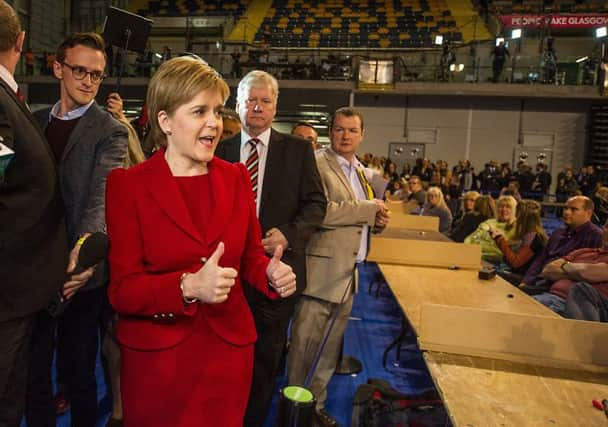From obscurity to monopoly: the SNP's grip on Glasgow


“If you had told me when I was a teenager, starting out in politics, that one day the SNP would win every constituency in the city of Glasgow, not just in one election but in two elections, I would scarcely have been able to believe it,” she announced.
The history books endorse her view. The year after Ms Sturgeon joined the party, aged 16, the SNP’s William Steven claimed the wooden spoon in the race to become Glasgow Cathcart’s MP, mustering a mere 3,883 ballots, a 10.3% share of the vote. The 32-year-old science technician, was one of six SNP candidates who came a distant fourth in their constituencies.
Advertisement
Hide AdAdvertisement
Hide AdFast forward three decades and the transformation in the party’s fortunes must seem like an act of alchemy to Mr Steven’s generation. In the Cathcart constituency at Holyrood, James Dornan romped home with 16,200 votes, a 52.9% share. His was one of seven SNP victories on a night that saw Glasgow turn yellow.
If the extent of the SNP’s dominance in the city is striking, the timescale in which it has achieved it is even more so. It is only a year since the Patrick Grady became its first MP in the city returned at a General Election, a vote that eventually saw all seven of its Westminster constituencies go to the SNP.
Save for the grip over Glasgow City Council held by Frank McAveety’s administration, its monopoly of the city’s powerbase is now complete. If 2015 was the year Labour felt robbed of a dominion over which it assumed heritable rights, 2016 saw the SNP return to strip out the plug sockets and light fixtures.
At the Emirates, the count was barely 90 minutes old when a downcast Labour doyen told me they faced an “uphill task” to retain its three constituencies from 2011. Come 2.30am yesterday, Anas Sarwar reiterated the view. “The vibe tonight looks difficult,” he admitted.
It would prove to be a discreet understatement. Anniesland was the first to declare a few minutes after 4am. A seat where Donald Dewar once enjoyed a near 11,000 majority was retained by the SNP, with Bill Kidd increasing his slender seven-strong majority in 2011 to 6,153. Twenty minutes later, former Scottish Labour leader, Johann Lamont, was sprung from her Pollok seat by Humza Yousaf.
The rout quickened come dawn, with Patricia Ferguson losing Maryhill and Springburn to Bob Doris, James Kelly defeated in Rutherglen by Clare Haughey, and Ivan McKee, a former Labour member, triumphing over Paul Martin in Provan. When the latter result was announced, Anne McLaughlin MP burst out in tears.
While election victory last year prompted a euphoric reaction in the SNP ranks at the Emirates, the mood this morning was more restrained, perhaps because the strong results were quietly anticipated.
Across an electoral map that turned yellow, the SNP commanded a 53.05% share of the overall constituency votes, an increase of 7.9% on 2011. In Provan and Maryhill and Springburn, the swings from Labour to the SNP were the third and fourth highest in Scotland.
Advertisement
Hide AdAdvertisement
Hide AdBut its clean sweep to power comes with a few interesting caveats. The increases in the SNP’s share of the votes were modest compared to the major gains it enjoyed at General Election, when it polled an average increase of 38.14% across the seven Westminster constituencies.
In Kelvin, Sandra White’s majority of 4,048 disguised the fact her share of the vote decreased by 4.8%, in large part due to a spirited campaign by Partrick Harvie from the Scottish Greens, who came second ahead of Labour’s Michael Shanks.
As the morning wore on, the Labour contingent, assumed an increasingly gloomy demeanour. Some of its candidates did not show up until the deluge of results was underway and even then, maintained a low profile.
With the party holding just one constituency seat in the west of Scotland - Jackie Baillie in Dumbarton - those hoary narratives about Red Clydeside increasingly seem like part of Scotland’s political past.
Yet the repercussions for Scottish Labour are unavoidable and will exercise much debate in its Glasgow ranks. Those consigned to the political wilderness in the early hours of yesterday morning included Ms Ferguson, a former cabinet minister, her husband, Bill Butler, and Mr Martin, a veteran MSP who followed in the footsteps of his father, Michael. The only consolation was the return of four MSPs on the list, among them Ms Lamont and Mr Sarwar.
For the Greens, early predictions they would squeeze Labour across the regional list proved premature, with only Patrick Harvie elected. The Tories, meanwhile, had cause to celebrate after Adam Tomkins and Annie Wells succeeding.
The periphery of the count was scattered with other subplots - the collapse of Solidarity that promises to expunge Tommy Sheridan from the city’s political life; the poor performance of Rise - but nothing rivalled the SNP’s surge and Labour’s collapse as the main plot points.
It may have seemed unthinkable a generation ago. Some may scarcely believe it still. But today, those trends are now cemented as the new reality in Glasgow politics.